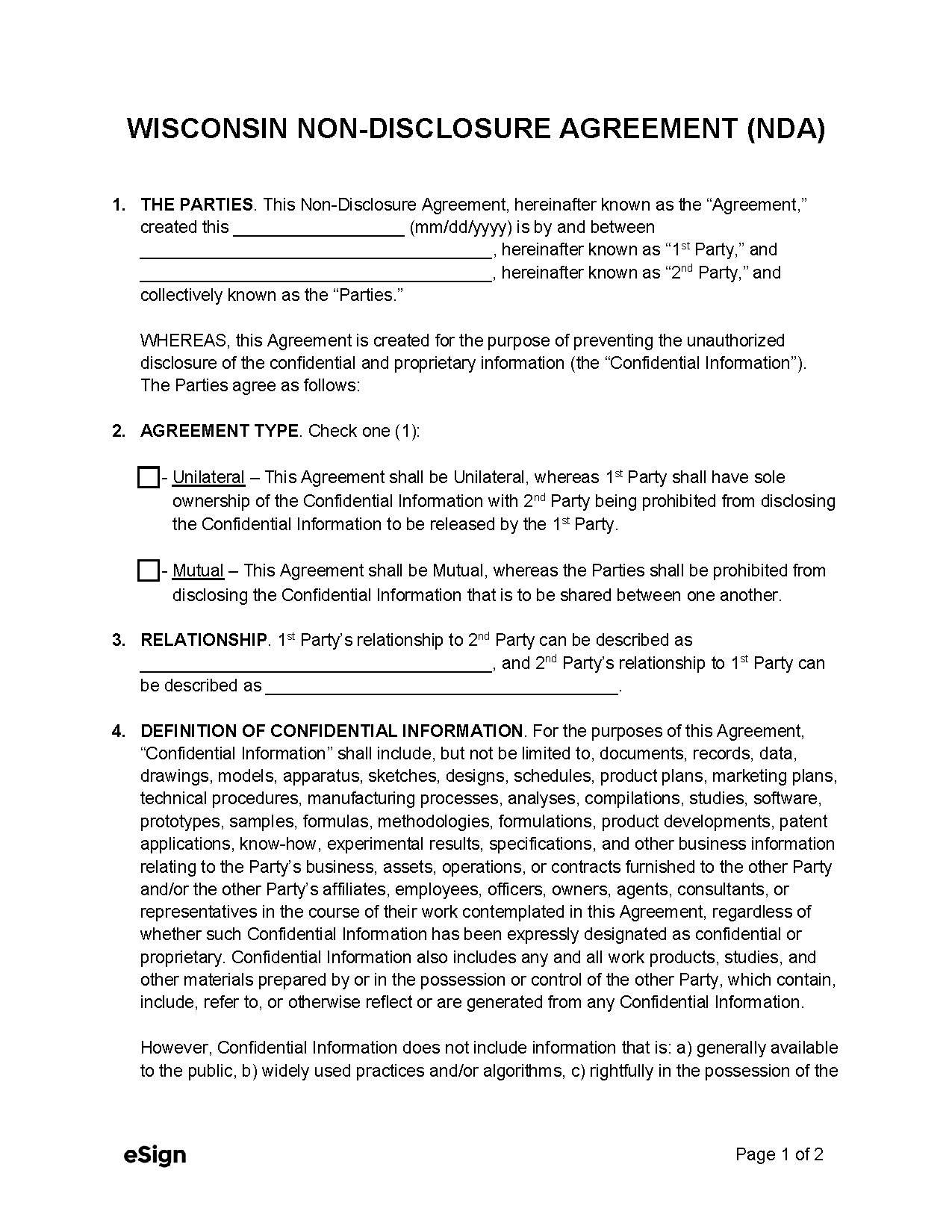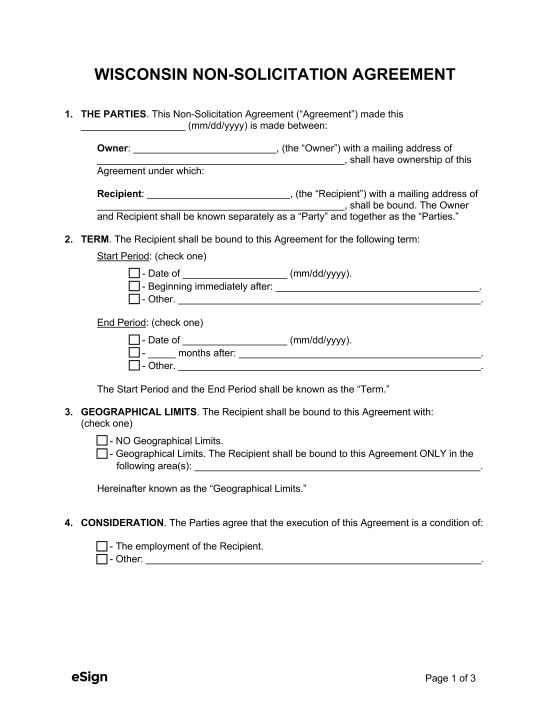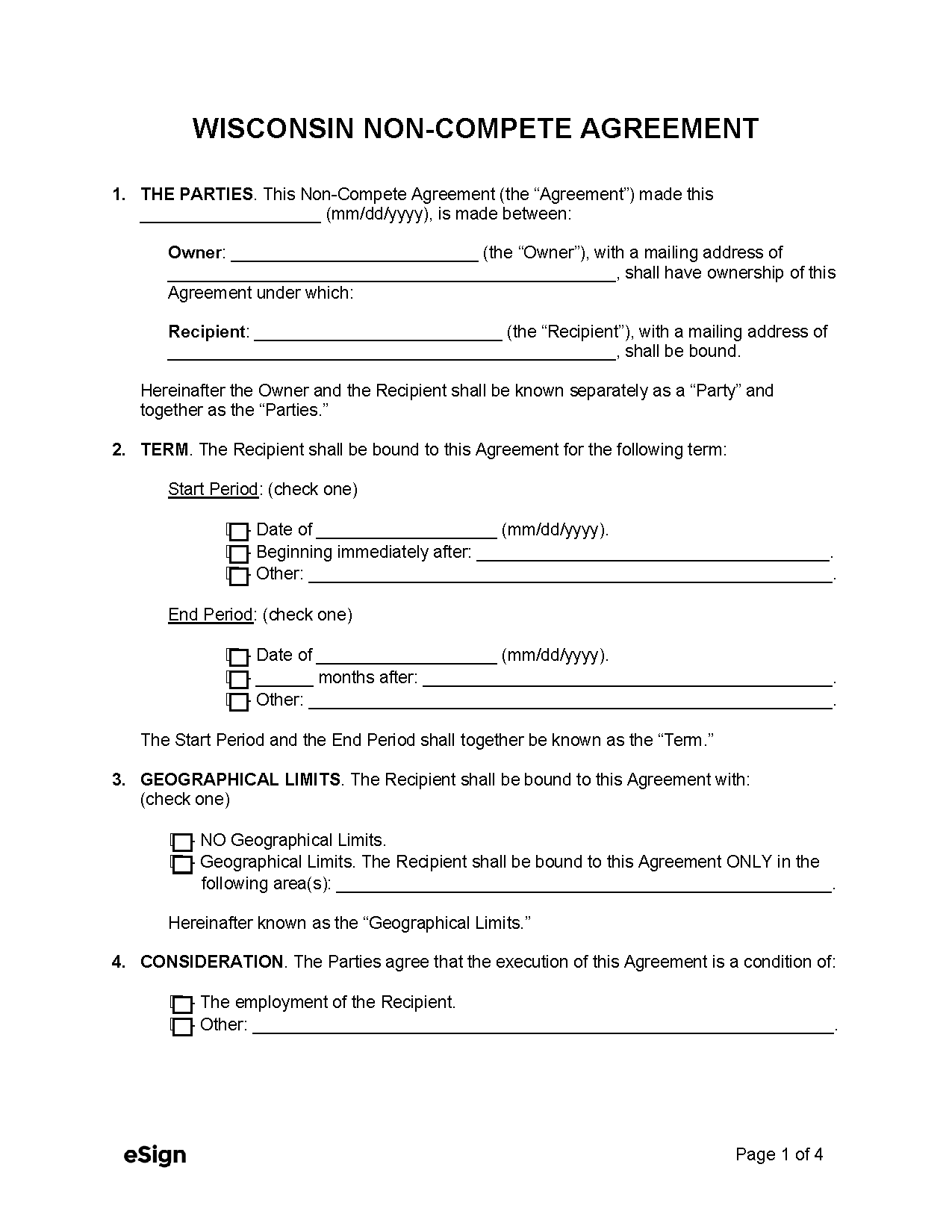A non-compete cannot unfairly limit a party’s ability to find gainful employment, and the court may not enforce the agreement if its restrictions are too broad.
Contents |
Enforceability in Wisconsin
Non-compete agreements are enforceable as per § 103.465 of the Wisconsin statutes. The law provides general guidelines for enforceability, requiring that a non-compete be necessary for the employer’s protection and that the restrictions be reasonable.[1] Agreements that lack a protectable interest cannot be enforced, regardless of whether they are reasonable.[2]
When it IS Enforceable
A non-compete agreement is valid so long as it complies with the conditions listed below:
- The activity, geographic, and time restrictions are reasonable and do not cause injury to the public.[3]
- The agreement is supported by consideration.[2]
- The agreement protects a legitimate interest, such as:
- company goodwill;
- client/customer relations;
- trade secrets; or
- company information or data.[4]
- The agreement is not unduly harmful or restricting to the employee.[5]
When it’s NOT Enforceable
- Restricting attorneys. An attorney is prohibited from making or entering into an agreement that restrains them from practicing law, including those made in connection to a client’s settlement. Agreements dealing with retirement benefits, however, may be permitted.[6]
Maximum Time Period
There is no Wisconsin statute that sets a limit for the duration of non-compete agreements. The courts have regularly upheld durations between one (1) and two (2) years, as in the following cases:
- A two (2) year restriction on an oil company salesman.[7]
- A two (2) year restriction preventing a physician from contacting former patients.[4]
- A one (1) year restriction on a lessee of a lunch wagon from soliciting the lessor’s former customers.[8]
- A one (1) year restriction upheld by a federal court prohibiting a franchisee from competing with the franchisor.[9]
Geographical Area
The geographical area must be reasonable and necessary to prevent unfair competition.[1] The region where the employer does business is usually considered an appropriate scope. Previous decisions made in Wisconsin courts have allowed for the following geographic restrictions:
- A twenty (20) mile radius on a physician.[4]
- A fifty (50) mile radius on the former medical director of a clinic.[10]
- A high-level employee was subject to a restriction that extended beyond where their employer’s customers’ location.[3]
Agreements without a defined geographic region are void.[11] Courts have also turned down countrywide restrictions for non-competes when the restricted party had only performed work in one county.[12][13]
Consideration
While not expressly stated in state statutes, common law has shown that agreements without consideration are unenforceable.[2] Employment is sufficient consideration if the contract is signed prior to or concurrently with the signing party accepting the job offer.[14] Continued employment has been deemed adequate consideration for at-will workers, though no set period has been defined as satisfactory.[15]
Financial compensation or bonuses are also valid forms of consideration provided they are given directly in connection with the agreement and solely to those signing a non-compete.[16] A court may decline to enforce a non-compete if an employer fails to make clear to the employee what they are providing as consideration.[2]
Sources
- Wis. Stat. § 103.465
- NBZ, Inc. v. Pilarski, 185 Wis. 2d 827, 520 N.W.2d 93 (Wis. Ct. App. 1994)
- Hunter of Wisconsin, Inc. v. Hamilton, 101 Wis. 2d 460, 304 N.W.2d 752 (Wis. 1981)
- Pollack v. Calimag, 157 Wis. 2d 222, 458 N.W.2d 591 (Wis. Ct. App. 1990)
- Star Direct, Inc. v. Dal Pra, 2009 WI 76, 319 Wis. 2d 274, 767 N.W.2d 898
- Wis. R. of Prof’l Conduct 20:5.6
- Lakeside Oil Co. v. Slutsky, 8 Wis. 2d 157, 164-66, 98 N.W.2d 415, 420 (1959)
- Chuck Wagon Catering, Inc. v. Raduege, 88 Wis. 2d 740, 753-55, 277 N.W.2d 787, 793 (1979)
- HR Block Eastern Tax Services, Inc. v. Vorpahl, 255 F. Supp. 2d 930, 935 (E.D. Wis. 2003)
- Fields Found., Ltd. v. Christensen, 103 Wis. 2d 465, 477-79, 309 N.W.2d 125, 132 (Ct. App. 1981)
- Gary Van Zeeland Talent, Inc. v. Sandas, 84 Wis. 2d 202, 217-19, 267 N.W.2d 242, 250 (1978)
- Union Central Life Ins. Co. v. Balistrieri, 19 Wis. 2d 265, 120 N.W.2d 126 (Wis. 1963)
- Equity Enterprises v. Milosch, 247 Wis. 2d 172, 178-79, 2001 WI App. 186, 633 N.W.2d 662, 666 (Wis. Ct. App. 2001)
- Wis. Ice & Coal Co. v. Lueth, 250 N.W. 819, 820 (Wis. 1933)
- Runzheimer Int’l, Ltd. v. Friedlen, 2015 WI 45, 362 Wis. 2d 100, 105-07, 862 N.W.2d 879, 882
- Medrehab of Wisconsin, Inc. v. Johnson, 218 Wis. 2d 163, 578 N.W.2d 208, at *1 (Ct. App. 1998)
- Selmer Co. v. Rinn, 2010 WI App 106, 328 Wis. 2d 263, 279-80, 789 N.W.2d 621, 629
- Reiman Associates, Inc. v. R/A Advertising, Inc., 102 Wis. 2d 305, 306 N.W.2d 292, 295-96 (Wis. Ct. App. 1981)
- Streiff v. American Family Mut. Ins. Co., 118 Wis. 2d 602, 348 N.W.2d 505 (Wis. 1984)
- Gen. Med. Corp. v. Kobs, 179 Wis. 2d 422, 431-33, 431507 N.W.2d 381, 385 (Ct. App. 1993)
Related Forms (2)

Download: PDF, Word (.docx), OpenDocument

Download: PDF, Word (.docx), OpenDocument
